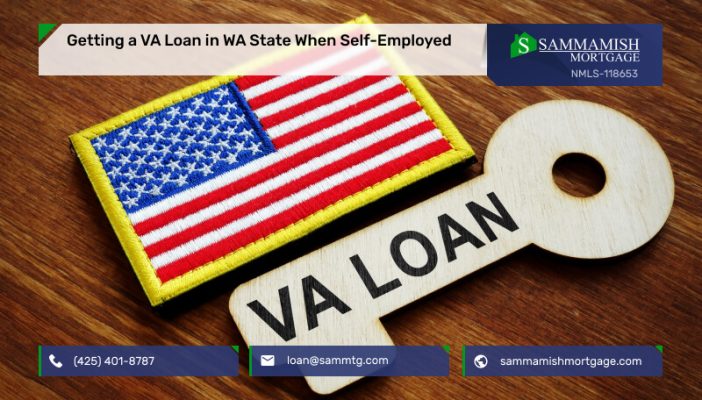No Obligation and transparency 24/7. Instantly compare live rates and costs from our network of lenders across the country. Real-time accurate rates and closing costs for a variety of loan programs custom to your specific situation.

According to the Washington State Department of Veterans Affairs, more than 500,000 veterans currently reside in Washington. And many of them are eligible for the VA home loan program, based on their prior military service and discharge status.
As a mortgage company that specializes in VA home loans for veterans, we regularly publish helpful mortgage guides geared toward this audience. This Washington VA loan guide focuses on a popular subject among military veterans who are planning to purchase a home:
Can I qualify for a VA loan in WA State when self-employed?
The short answer is yes. A veteran in the state of Washington who has decent credit, steady income, and manageable debt could qualify for a VA loan, even when self-employed.
But unlike a W-2 worker, self-employed borrowers often have to provide some additional documents when applying for a VA loan to buy a house. So, let’s start with that.
The U.S. Department of Veterans Affairs (VA) home loan program rewards military members and veterans by offering a highly flexible mortgage product. With a VA loan, eligible borrowers can finance the entire purchase price without having to pay for mortgage insurance.
VA loans are also one of the easiest types of mortgage loans to qualify for. That’s because the federal government backs these loans, giving lenders an extra level of protection against borrower default.
If you apply for a VA loan in the state of Washington, you’ll have to submit a variety of financial documents related to your income, debts, and employment situation. This is true for both traditionally employed (W-2) employees and self-employed 1099 business owners.
But the VA loan requirements are a bit stiffer for self-employed veterans. These borrowers typically have to submit additional documents, such as:
These and other documents allow mortgage underwriters to determine if a self-employed individual has a stable enough financial situation to qualify for a VA-guaranteed home loan.
The Department of Veterans Affairs has a two-year income rule for self-employed borrowers who want to use a VA loan to buy a house. This means the borrower should have at least two years of stable income, with the documentation needed to verify it.
This is true for conventional (non-VA) home loans as well. In fact, most of the mortgage programs available today require two years of consecutive employment or consistent income, either with the same employer or within the same field.
Banks and lenders often give self-employed borrowers a closer look, since they often don’t receive a “steady paycheck” like a traditionally employed W-2 worker. It’s all part of the due diligence and risk-assessment process.
But there are exceptions to the two-year rule for VA loans. According to the official mortgage handbook, a borrower with less than two years of stable income could still qualify if they’ve had “previous related employment and/or specialized training.”
The takeaway: Veterans in Washington shouldn’t assume they’re ineligible for a VA loan because of their employment or income situation. Speak to an approved lender (like us) to find out where you stand!
For the most part, the VA loan process works the same for both self-employed veterans and those who are traditionally employed with a company or organization. But there are some important distinctions, including the financial documents mentioned earlier.
While the self-employed mortgage application and approval process can vary from one borrower to the next, it usually involves the following steps:
This certificate verifies your eligibility for a VA loan based on your prior military service and discharge status. You can apply for it online through the VA eBenefits portal, through an approved mortgage lender, or by mail. You’ll need this document to apply.
Not all mortgage lenders in Washington offer VA loans. And among those that do, not all of them specialize in working with military veterans.
So you’ll need to research and compare different lenders to find one with experience working with self-employed borrowers seeking VA loans. (Hint: Sammamish Mortgage checks all of these boxes and serves the entire state of Washington!)
In addition to the COE document mentioned above, self-employed borrowers usually have to provide some or all of the following documents:
Your lender will give you a list of the required documents, so there shouldn’t be any surprises or guesswork here.
VA loans use the same standard application form as other types of home loans, including FHA and conventional. It’s called the Uniform Residential Loan Application (URLA). It requires information relating to your employment history, income, assets, and liabilities.
After these initial steps, the home will have to be appraised, and your loan file will then proceed to the underwriting stage. You might receive requests from the underwriter for additional information, so keep an eye out for that.
In addition to having stable income, self-employed veterans seeking a VA loan must have enough money in the bank to cover their closing costs and a possible down payment.
Note: VA loans do not require a down payment. But some veterans in Washington choose to make one in order to reduce their monthly payments and total interest costs.
Your lender will probably request bank statements for the past two or three months to make sure you have enough “cash to close.”
Even if you don’t make a down payment on your home purchase, the closing costs alone could add up to thousands of dollars. Closing costs on a VA loan in Washington typically range from 3% to 5% of the loan amount. So the sooner you can start saving for it, the better.
We’ve covered a lot of information in this guide, so let’s wrap up with a summary. Here are five important points you should take away from this guide:
The VA loan program offers a number of compelling benefits, including the ability to finance the entire purchase price. This program can help self-employed veterans in Washington achieve the dream of homeownership. So it definitely warrants additional research and consideration.
If you’re considering buying a home in WA State with a VA loan and applying for a self-employed VA loan, we can help. Since 1992, Sammamish Mortgage has been helping a variety of borrowers, including self-employed veteran, get the loan they need. Get in touch with us today to get a rate quote and apply for mortgage pre-approval!


Whether you’re buying a home or ready to refinance, our professionals can help.
{hours_open} - {hours_closed} Pacific
No Obligation and transparency 24/7. Instantly compare live rates and costs from our network of lenders across the country. Real-time accurate rates and closing costs for a variety of loan programs custom to your specific situation.